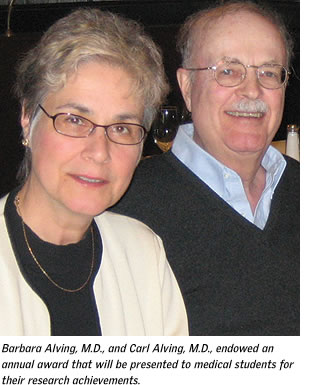In 1965 Carl Alving, M.D., then a third-year medical
student, received the University of Miami School
of Medicine
Leonard G. Roundtree Award for first prize in the
medical student research competition. This was conferred
for research he had completed during a summer at
The Johns Hopkins University under the mentorship
of Albert Lehninger, Ph.D., who was a pioneer in
the field of bioenergetics. It would be an event
that would change the course of his career.
 “That award
was a true stimulus to developing my career as a researcher,” Alving
says. “After the
award, Dr. Harvey Blank, founder and first chairman
of the Department of Dermatology and Cutaneous Surgery,
came up to me and invited me to participate in his
laboratory
on the weekends. He continued to be a mentor and a
guide for the remainder of my time at the school.” “That award
was a true stimulus to developing my career as a researcher,” Alving
says. “After the
award, Dr. Harvey Blank, founder and first chairman
of the Department of Dermatology and Cutaneous Surgery,
came up to me and invited me to participate in his
laboratory
on the weekends. He continued to be a mentor and a
guide for the remainder of my time at the school.”
When Alving returned
for his 40th class reunion, he ran into Barry Festoff,
M.D., a classmate with whom
a friendly
rivalry had developed. In a strange coincidence,
Festoff had brought a watch he had won for the Roche
Research
Award in 1965. They shared enthusiastic memories
of the watch and reminisced about research awards the
school
used to offer and how much they had meant to both
of
them.
“I remember
how pleased I was to have won the Leonard G. Roundtree
Award, and I was disappointed to learn that
it was no longer offered to students,” he
says. “I
went home and discussed it with my wife, and we
decided that we wanted to restore such an award
to the school.”
The Alvings made
a $100,000 gift to the Miller School of Medicine to
establish the Drs. Carl and
Barbara
Alv ing Endowment Award. The award will be presented
to the
medical student who has had the most outstanding
research achievement of the year. An award committee
will select
the winning candidate based on criteria that
it establishes. The student will win a medal and an
unrestricted,
monetary award to encourage the continued pursuit
of medical
research. The award, open to any medical student,
may be won multiple
times during a student’s medical school career.
“Although
I trained in internal medicine, I have actually dedicated
my career to doing fundamental research rather
than direct patient care,” says Alving. “It
naturally makes sense that I would want to
inspire students who have an interest in research.
My wife also has had
an illustrious research career and is very
deeply involved in medical research. We believe
the promotion of research
will benefit people greatly because it provides
the fundamental underpinning of medicine.
“I would
hope there might be a possibility that this would serve
as inspiration for additional research resources
to the medical school by others and provide
stimulation for medical students who are interested
in engaging in
a research career.” |